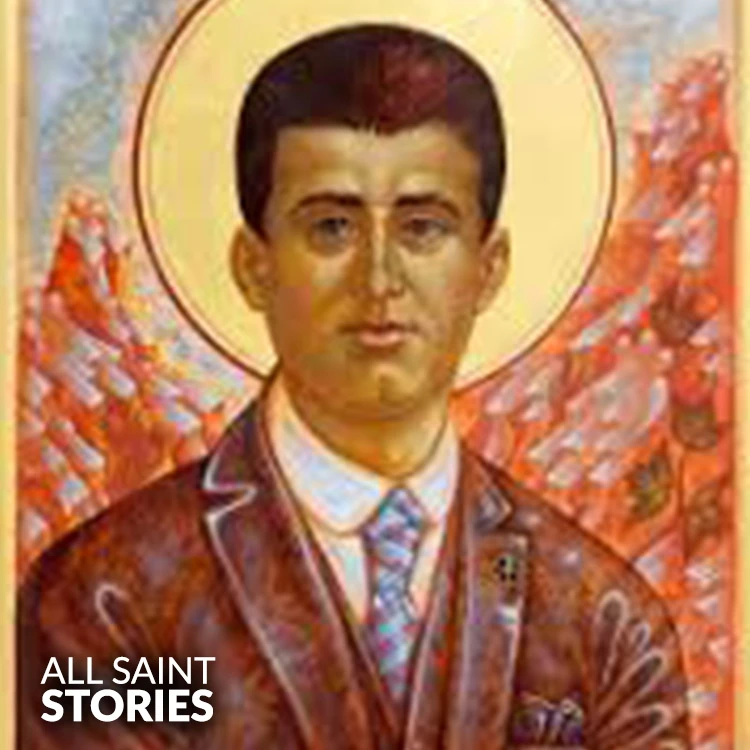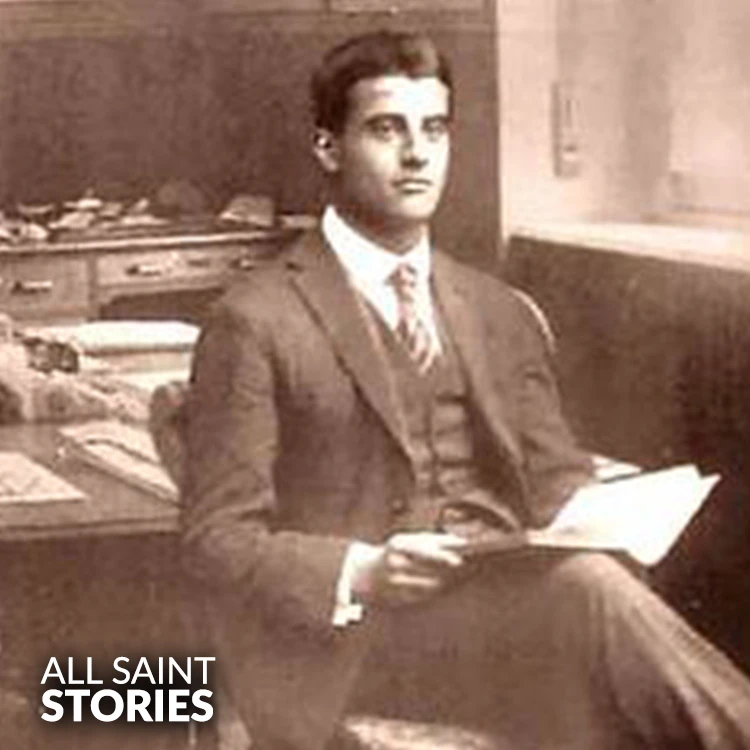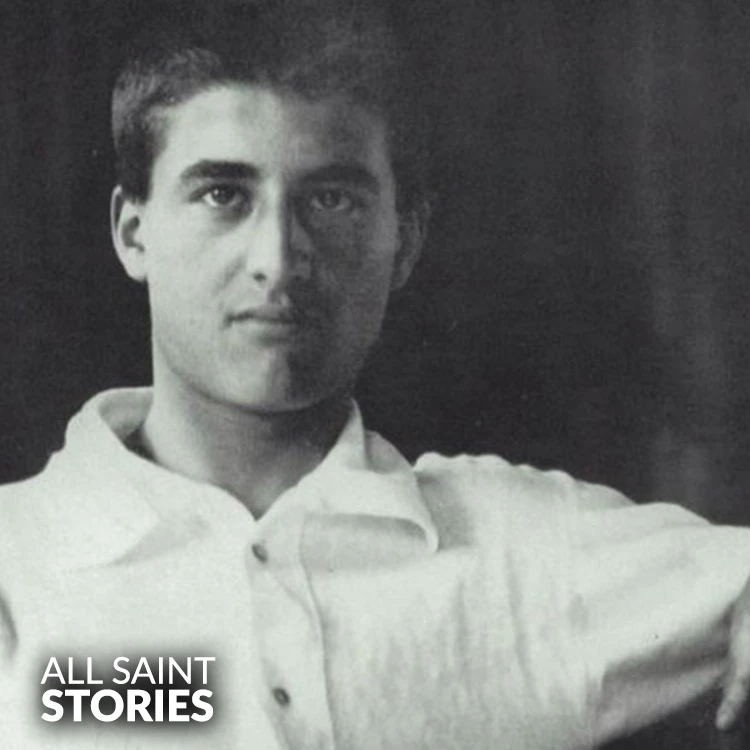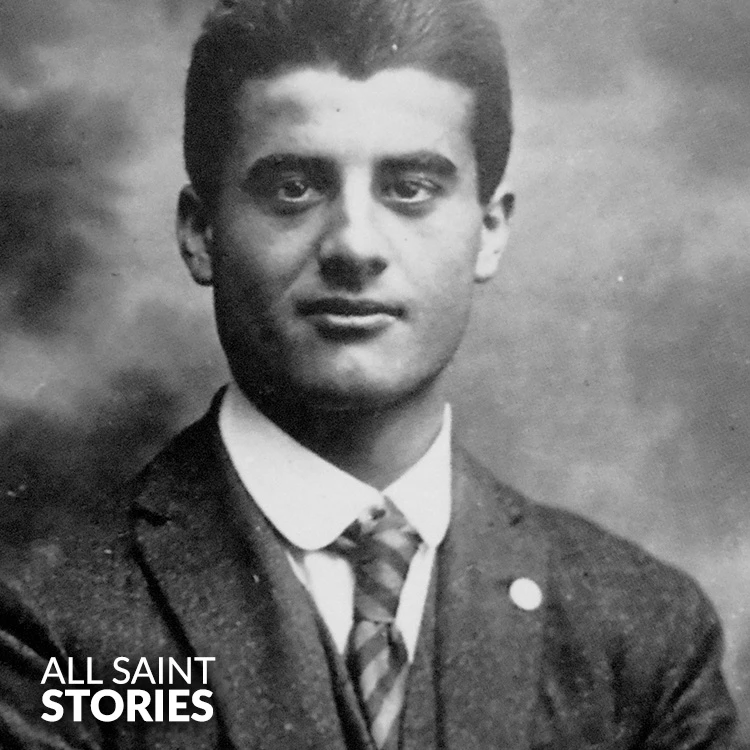Blessed Pier Giorgio, you lived with joy, climbed to the heights, and loved the poor with a heart full of Christ. Inspire us to serve with courage, to love with compassion, and to live our faith boldly in the world. May your example lead us ever 'Verso l’alto'—to the heights of holiness. Amen.
BLESSED . PIER GIORGIO FRASSATI
BLESSED . PIER GIORGIO FRASSATI

Pier Giorgio Frassati was a joyful, devout young man who dedicated his short life to serving the poor and living the Gospel. A lover of the mountains and an advocate for social justice, he inspired others through his faith, charity, and passion for God.
Pier Giorgio Frassati was born on April 6, 1901, in Turin, Italy, into a prominent and wealthy family. His father, Alfredo Frassati, was the founder and director of the liberal newspaper La Stampa and served as an Italian ambassador. His mother, Adelaide Ametis, was a painter. Despite their affluence and status, Pier Giorgio chose a life rooted in simplicity, compassion, and deep Catholic faith.
From a young age, Pier Giorgio was known for his concern for the poor and marginalized. He often gave away his belongings, including money, shoes, and even train fare, to help those in need. He joined the St. Vincent de Paul Society at seventeen and became actively involved in Catholic Action, dedicating himself to charitable works, evangelization, and social reform rooted in Catholic teaching. He was particularly passionate about Pope Leo XIII’s encyclical Rerum Novarum, which emphasized workers' rights and the responsibilities of Christians toward social justice.
Frassati’s life was characterized by a balance of intense spirituality and active engagement with the world. He had a strong devotion to the Eucharist and Our Lady, and he regularly attended daily Mass and Eucharistic Adoration. Despite the spiritual seriousness, he was full of joy, humor, and a love for nature—especially the mountains, which became both a literal and spiritual symbol for him. His now-famous motto, Verso l’alto ("To the heights"), reflects not only his love of mountain climbing but also his spiritual striving toward holiness.
In addition to his religious and charitable pursuits, Frassati studied engineering at the Royal Polytechnic of Turin, with the intention of using his skills to help miners and laborers. His commitment to social causes was not merely theoretical but deeply personal; he spent his time in poor neighborhoods, nursing the sick and assisting families in crisis.
In June 1925, Pier Giorgio contracted poliomyelitis, likely from the very people he served in the slums of Turin. His illness progressed rapidly, and because he chose not to speak of his suffering—so as not to worry his family—his condition went unnoticed until it was too late. He died on July 4, 1925, at the age of 24.
At his funeral, the streets of Turin were filled with mourners, not the elite of society, but the poor, the sick, and the forgotten—those whose lives he had touched with quiet compassion. Only then did his family fully realize the depth of his hidden charity.
Pier Giorgio’s life quickly became an inspiration, especially to young Catholics. Pope John Paul II, who greatly admired him, beatified him on May 20, 1990, calling him the “Man of the Beatitudes.” Though he is not yet canonized, he is venerated widely across the world, particularly by youth, students, and young professionals seeking to live a life of Christian virtue in modern society.
Frassati’s body was found to be incorrupt when exhumed in 1981 and is now enshrined in the Cathedral of St. John the Baptist in Turin. His example continues to inspire countless initiatives in youth ministry, social justice, and Catholic activism. His passion, humility, and radiant joy make him one of the most beloved figures of contemporary Catholic spirituality.
Video Not Found
The information on this website is compiled from various trusted sources. While we aim for accuracy, some details may be incomplete or contain discrepancies.
If you notice any errors or have additional information about this saint, please use the form on the left to share your suggestions. Your input helps us improve and maintain reliable content for everyone.
All submissions are reviewed carefully, and your personal details will remain confidential. Thank you for contributing to the accuracy and value of this resource.
Credits & Acknowledgments
- Anudina Visudhar (Malayalam) – Life of Saints for Everyday
by Msgr. Thomas Moothedan, M.A., D.D. - Saint Companions for Each Day
by A. J. M. Mausolfe & J. K. Mausolfe - US Catholic (Faith in Real Life) – Informational articles
- Wikipedia – General reference content and images
- Anastpaul.com – Saint images and reflections
- Pravachaka Sabdam (Malayalam) – Saint-related content and insights
We sincerely thank these authors and platforms for their valuable contributions. If we have unintentionally missed any attribution, please notify us, and we will make the correction promptly.
If you have any suggestion about BLESSED . PIER GIORGIO FRASSATI
Your suggestion will help improve the information about this saint. Your details will not be disclosed anywhere.
© 2025 Copyright @ www.allsaintstories.com





 English
English
 Italian
Italian
 French
French
 Spanish
Spanish
 Malayalam
Malayalam
 Russian
Russian
 Korean
Korean
 Sinhala
Sinhala
 Japanese
Japanese
 Arabic
Arabic
 Portuguese
Portuguese
 Bantu
Bantu
 Greek
Greek
 German
German
 Dutch
Dutch
 Filipino
Filipino